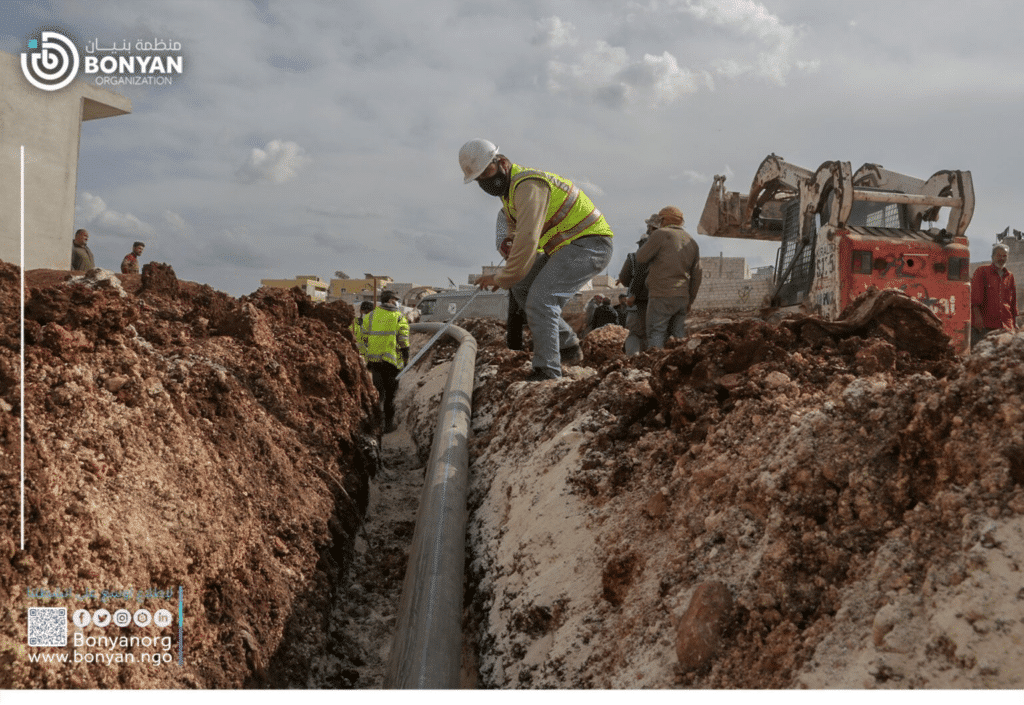Insufficient sewage networks is a pressing issue that compromises the quality of life of millions of refugees.
From the outbreak of diseases and mental issues to environmental and economic problems, refugees are facing detrimental consequences as a result of this issue.
This article focuses on the challenges caused by inadequate sewage networks in refugee settings.
Public Health Impact
There are several public health consequences that might arise from poor sewage treatment in refugee camps. These include:
- Poor sanitation: Inadequate sewage networks can lead to poor sanitation in refugee camps, increasing the risk of waterborne diseases such as cholera, typhoid, and dysentery.
- Contamination of drinking water: Uncollected sewage can seep into water sources, leading to the contamination of drinking water and serious health risks for those that consume it.
- Spread of disease: Poor sanitation and contaminated drinking water can increase the spread of infectious diseases such as hepatitis A, which is especially dangerous for vulnerable populations such as children.
- Mental Health Issues: Insufficient sewage infrastructure can cause overcrowding, leading to mental health issues such as stress, anxiety, depression, and post-traumatic stress disorder.
- Environmental Pollution: Uncollected sewage can cause environmental pollution, causing wide-reaching consequences on the health of nearby communities.
Disease Outbreaks
Refugees are at risk of the spread of water-borne illnesses and disease outbreaks due to the lack of proper sanitation in refugee camps.
There is a high risk of disease outbreaks and water-borne illnesses due to the lack of appropriate sanitation in refugee camps.
Inadequate sanitation and hygiene in refugee camps can lead to the spread of infectious diseases such as cholera, typhoid, dysentery, and hepatitis A.
Additionally, insufficient access to clean water and sanitation facilities can lead to the contamination of food, increased risk of water-borne diseases, and the spread of water-borne illnesses, such as malaria and dengue fever.
Besides, inadequate hygiene can lead to an increased risk of skin and respiratory infections.
Environmental Impact
The negative environmental impact of inadequate sewage networks can lead to many detrimental issues. These issues are:
- Contamination of water sources: Insufficient sewage networks in refugee camps can lead to raw sewage leaking into nearby water sources, contaminating the water and making it unsafe for human and animal consumption. This can also lead to the spread of waterborne infections.
- Air pollution: Inadequate sewage networks in refugee communities can cause the release of methane and other pollutants into the air, creating a health danger for those living in the area.
- Land pollution: Uncollected sewage can lead to the proliferation of solid waste on land, causing soil contamination and the spread of disease-carrying agents, such as mosquitoes.
- Loss of biodiversity: Insufficient sewage networks in refugee areas can also lead to the collapse of ecosystems, as well as the loss of biodiversity in an area.

Economic Impact
The inadequate sewage networks in refugee camps can cause various negative economic outcomes.
These include the spread of disease, expensive clean-up operations, increased healthcare costs, and lower productivity due to illness.
Such issues can result in declined economic activity and a weakened economy.
Dignity and Well-being
Shortages in sewage networks can lead to many psychological and health issues, affecting the dignity and well-being of the refugees.
- Poor sanitation: Inadequate sewage networks in refugee camps can lead to sewage flooding into the camp, causing poor sanitation and hygiene conditions.
This can cause various health problems and spread diseases like diarrhea, cholera, and typhoid. - Unsafe drinking water: Inadequate sewage networks can lead to contaminated drinking water, as untreated sewage is more likely to seep into water sources.
This can lead to further health problems and a lack of safe drinking water.
- Lack of privacy: Insufficient sewage networks often lead to a lack of privacy.
Refugee camps tend to be overcrowded, and inadequate sewage networks make having private areas for sanitation difficult.
This can be especially problematic for women, who may feel uncomfortable using shared toilets.
- Mental health impacts: Scarce sewage networks can lead to feelings of shame, humiliation, powerlessness, and lack of control.
This can lead to mental health problems, such as anxiety and depression.
Rehabilitation Strategies
Many strategies could be applied to refugee camps to rehabilitate sewage networks. These include:
- Installing advanced wastewater treatment systems.
- Constructing new infrastructure.
- Improving maintenance practices.
- Developing existing sewage networks.
- Investing in sanitation education.
Acknowledging the importance of water facilities to meet refugees’ needs for safe drinking water and sanitation, Bonyan Organization is now holding campaigns to help provide refugees with water facilities and repair the damaged ones.
You can now extend a helping hand to refugees who are in dire need of water, which is a basic necessity for human beings to survive, be productive, and lead a healthy life.
Donate to help build refugee communities
Donate at the following links now to help build refugee communities!
Resources
Supporting Refugee Children & Youth: Tips for Educators.
Culturally responsive practices for supporting refugee adolescents.
FAQ
What are the negative public health consequences of inadequate sewage networks in refugee camps?
The negative public health consequences of inadequate sewage networks in refugee camps include:
Poor sanitation
Contamination of drinking water
Spread of Disease
Mental Health Issues.
Environmental Pollution.
Why is access to clean water and proper sanitation crucial for maintaining the dignity and well-being of refugees?
Access to clean water and proper sanitation is crucial for maintaining the dignity and well-being of refugees because it will help reduce physical and mental health issues.



